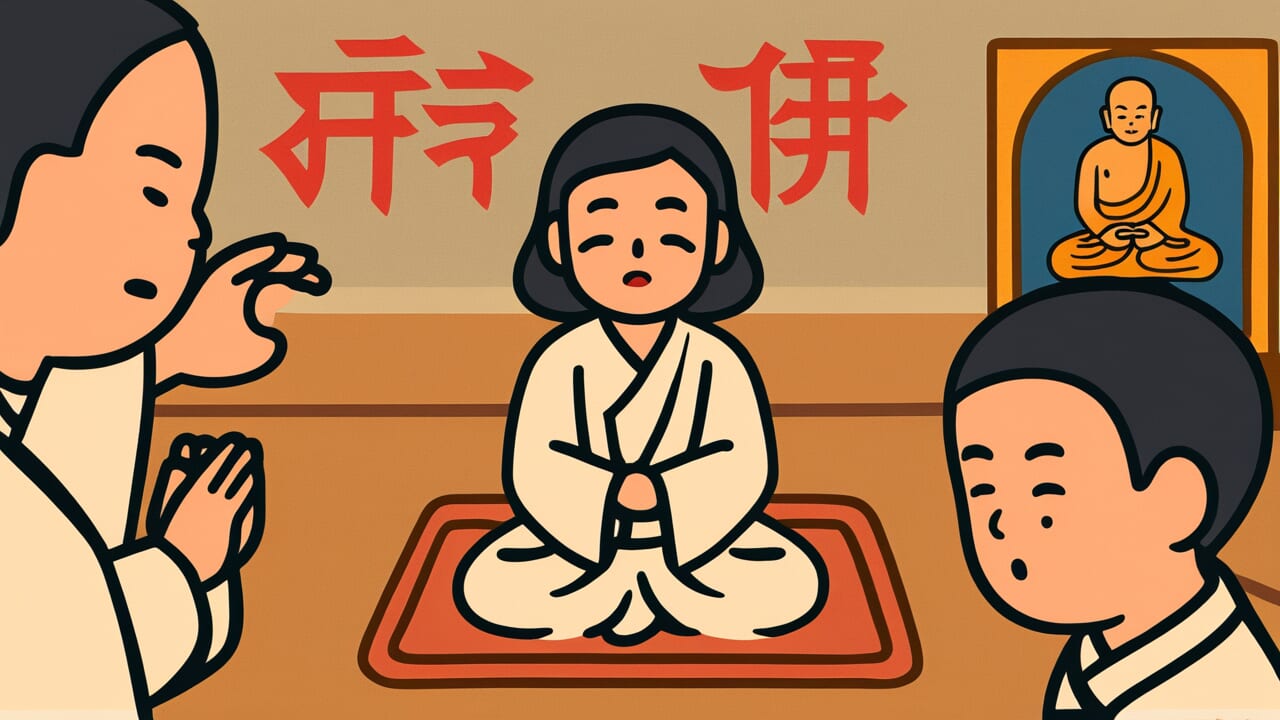How to Read “Everyone chants prayers at their deathbed”
Imawa no nenbutsu daremo tonaeru
Meaning of “Everyone chants prayers at their deathbed”
This proverb means that when facing death, everyone turns to gods and Buddha for help through prayer.
Even people who normally have no faith and don’t believe in gods or Buddha will chant prayers seeking salvation when their life is about to end. This reveals a fundamental aspect of human nature.
The proverb is used when pointing out how people who usually act tough or pretend not to care suddenly change their attitude in desperate situations.
It’s especially common in contexts that highlight the contradiction of people who normally mock religion suddenly relying on divine help when facing difficulties.
This expression endures because it captures a universal truth. Before the absolute terror of death, people’s true feelings and weaknesses are exposed.
Even today, this proverb is understood as insight into human psychology when pointing out the gap between someone’s usual attitude and their behavior in crisis.
Origin and Etymology
The exact first appearance of this proverb in literature is unclear. However, we can understand it by examining its component words.
“Imawa” is an old Japanese word meaning the moment of death or one’s deathbed. “Wa” refers to a boundary, pointing to the most critical moment at the border between life and death.
“Nenbutsu” is a Buddhist practice of chanting the name of Amida Buddha. It spread widely throughout Japan from the Heian period onward.
In the teachings of Pure Land Buddhism, chanting nenbutsu was believed to ensure rebirth in paradise. This belief took deep root among common people.
Even people who weren’t particularly devout in daily life would remember the nenbutsu teachings they’d heard since childhood when facing death’s terror. They would cling to these prayers desperately.
This proverb likely emerged from observing such human behavior over many generations.
It expresses human weakness and desperation. Even those who normally lack faith and disregard gods and Buddha will seek salvation through prayer before death’s absolute terror.
This proverb could only emerge from Japanese society where Buddhism was deeply woven into daily life. It represents sharp observation of human nature.
Usage Examples
- He used to say faith was meaningless, but after falling seriously ill, “Everyone chants prayers at their deathbed” proved true. Now he visits the temple daily.
- People who talk tough are often the first to prove “Everyone chants prayers at their deathbed” when crisis strikes. In the end, we’re all weak humans.
Universal Wisdom
This proverb offers deep insight into fundamental human weakness. It shows that this weakness is what makes us truly human.
No matter how tough you act or how rational you try to be, everyone becomes equally powerless before death’s absolute terror.
Why was this proverb created and passed down through generations? Because humans are essentially lonely and fragile beings.
In daily life, we wear various suits of armor. We pretend to be strong, boast of our knowledge, and sometimes even deny faith.
But these are all defense mechanisms to avoid facing our own weakness.
The ultimate situation of death’s moment strips away all such pretense. What’s revealed is a pure soul seeking salvation.
When someone who claimed not to believe in gods or Buddha chants prayers, it’s not hypocrisy. It’s an instinctive thirst for hope that all humans possess.
This proverb seems to criticize human contradiction, but it actually contains deep empathy.
Everyone is weak. Everyone seeks salvation. Acknowledging this fact is the beginning of true human understanding.
Our ancestors saw this universal truth and condensed it into brief words to pass down to future generations.
When AI Hears This
The human brain contains two coexisting defense systems, old and new.
The new system is rational thinking centered in the prefrontal cortex. This enables the recognition that “religion is human-made.”
But the old system is rooted in the limbic system as survival instinct. This generates the desire to “be protected by something greater than oneself.”
What’s interesting is how the power balance between these two systems reverses as death approaches.
Psychologists Greenberg and colleagues conducted experiments where subjects were asked questions that made them think about death.
Immediately afterward, people who normally identified as non-religious showed favorable responses to religious symbols and rituals.
In other words, the intense stress of death’s terror breaks through reason’s surveillance and awakens ancient instinct.
This is also a matter of the brain’s energy allocation. Complex thinking in the prefrontal cortex consumes massive energy.
But in the emergency of approaching death, the brain switches to energy-saving mode.
What automatically activates then is the behavioral pattern of “prayer” that has supported humanity for tens of thousands of years.
Chanting nenbutsu isn’t a result of rational judgment. It’s the activation of evolutionary memory that surfaces in extreme conditions.
No matter how rational a person normally is, they cannot escape this instinctive switch. This isn’t shameful.
It’s the final safety net the brain has prepared for survival.
Lessons for Today
This proverb teaches modern people the importance of having courage to acknowledge our own weakness.
We try daily to be strong and perfect. But this proverb gently tells us it’s okay to be weak.
Everyone feels fear. Everyone seeks salvation. This is what it means to be human.
Modern society has an atmosphere where showing weakness isn’t allowed. On social media, only success stories are shared. Worries and anxieties tend to be hidden.
But remember this proverb. No matter how tough someone acts, they carry anxiety deep in their heart.
This isn’t shameful. It’s natural for humans.
What matters is facing your own weakness before you’re cornered. Ask for help honestly when you’re in trouble.
Talk to someone when you’re anxious. Such everyday expressions of weakness actually lead to the strongest way of living.
Neither you nor I need to be perfect. Acknowledging weakness and living while supporting each other is what truly matters.
Isn’t this the real humanity that this proverb conveys to the modern world?



Comments